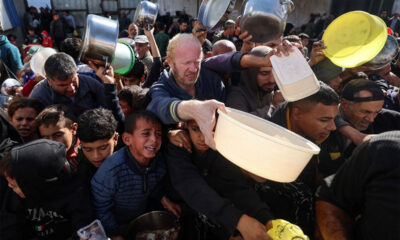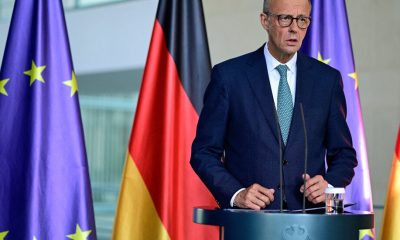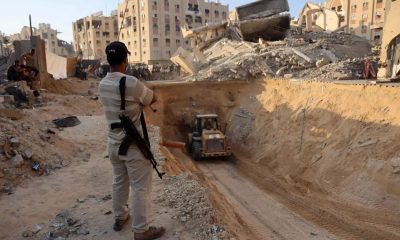International
Gaza ceasefire: Israel’s PM Benjamin Netanyahu rejects Hamas’s proposed terms
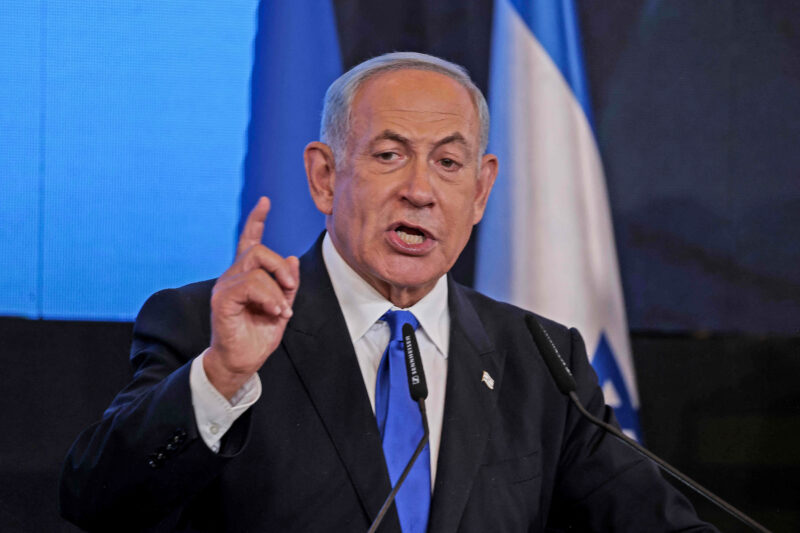
Gaza ceasefire: Israel’s PM Benjamin Netanyahu rejects Hamas’s proposed terms
Israeli Prime Minister Benjamin Netanyahu on Wednesday rejected Hamas’s terms for a ceasefire and hostage-release agreement, calling them “delusional,” a position that complicates efforts to strike a deal between the sides.
Netanyahu vowed to press ahead with Israel’s four-month-long war in the Gaza Strip against the militant group Hamas until achieving “absolute victory.”
The Israeli leader made the comments shortly after meeting U.S. Secretary of State Antony Blinken, who has been travelling the region in hopes of securing a ceasefire agreement.
“Surrendering to Hamas’s delusional demands that we heard now not only won’t lead to freeing the captives, it will just invite another massacre,” Netanyahu said during a nationally televised evening news conference.
“We are on the way to an absolute victory,” Netanyahu said, adding that the operation would last months, not years. “There is no other solution.”
Hamas can’t keep control: PM
Netanyahu ruled out any arrangement that leaves Hamas in full or partial control of Gaza. He also said that Israel is the “only power” capable of guaranteeing security in the long term.
Blinken said on Wednesday that he believes a ceasefire and hostage-release agreement between Israel and Hamas was still possible, despite the two sides being far apart on the central terms for a deal.
READ ALSO:
- 88.4m people in Nigeria living in extreme poverty – Fadeshemi
- NSCDC arrests five oil thieves, impounds 15,000 litres of diesel
- Court sends Lagos pastor, wife to prison over N33.8m fraud
“It’s not flipping a light switch. It’s not yes or no,” he said.
Hamas laid out a detailed, three-phase plan to unfold over four and a half months, responding to a proposal drawn up by the United States, Israel, Qatar and Egypt. The plan stipulates that all hostages would be released in exchange for hundreds of Palestinians imprisoned by Israel, including senior militants, and an end to the war.
Israel has made destroying Hamas’s governing and military abilities one of its wartime objectives, and the group’s proposal would effectively leave it in power in Gaza and allow it to rebuild its military capabilities.
U.S. President Joe Biden said Hamas’s demands are “a little over the top” but that negotiations will continue.
The deadliest round of fighting in the history of the Israeli-Palestinian conflict has levelled entire neighbourhoods and driven the vast majority of Gaza’s population from their homes. More than 27,000 Palestinians have been killed, Gaza’s Health Ministry says.
Iran-backed militant groups across the region have conducted attacks — mostly on U.S. and Israeli targets — in solidarity with the Palestinians, drawing reprisals as the risk of a wider conflict grows.
Israel remains deeply shaken by the Oct. 7 attack in which Hamas-led militants burst through the country’s vaunted defences and rampaged across southern Israel, killing some 1,200 people, mostly civilians, and abducting some 250, about half of whom remain in captivity in Gaza, according to Israeli officials.
Blinken is trying to advance the ceasefire talks while pushing for a larger postwar settlement in which Saudi Arabia would normalize relations with Israel in return for a “clear, credible, time-bound path to the establishment of a Palestinian state.”
READ ALSO:
- Alleged N754.8m fraud: Court adjourns ex-NIMASA DG, Akpobolokemi’s case till Feb. 27
- Tinubu govt doesn’t have capacity to solve Nigeria’s problems – LP
- Cote d’Ivoire beat DR Congo to set up AFCON final clash against Nigeria
But the increasingly unpopular Netanyahu is opposed to Palestinian statehood, and his hawkish governing coalition could collapse if he is seen as making too many concessions.
Ceaseless war, endless stress
There is little talk of grand diplomatic bargains in Gaza, where Palestinians yearn for an end to fighting that has upended every aspect of their lives.
“We pray to God that it stops,” said Ghazi Abu Issa, who fled his home and sought shelter in the central town of Deir al-Balah. “There is no water, electricity, food or bathrooms.”
Those living in tents have been drenched by winter rains and flooding.
New mothers struggle to get baby formula and diapers. Some have resorted to feeding solid food to babies younger than six months old despite the health risks it poses.
Blinken noted the devastation inflicted on Gaza civilians, saying that “the daily toll that [Israel’s] military operations continue to take on innocent civilians remains too high.”
The 27,707 Palestinians killed include 123 bodies brought to hospitals in just the last 24 hours, Gaza’s Health Ministry said on Wednesday, adding that at least 11,000 wounded people need to be urgently evacuated from the territory.
The ministry does not distinguish between civilians and combatants in its figures but says most of the dead have been women and children.
Israel has ordered Palestinians to evacuate areas that make up two-thirds of the tiny coastal territory. Most of the displaced are packed into the southern town of Rafah near the border with Egypt, where many are living in squalid tent camps and overflowing shelters run by the United Nations.
Hamas has continued to put up stiff resistance across the territory, and its police force has returned to the streets in places where Israeli troops have pulled back. Hamas is still holding more than 130 hostages, but about 30 of them are believed to be dead, with the vast majority killed on Oct. 7.
Gaza ceasefire: Israel’s PM Benjamin Netanyahu rejects Hamas’s proposed terms
International
Canada Opens New Express Entry Draw for Nigerian Workers, Others

Canada Opens New Express Entry Draw for Nigerian Workers, Others
The Government of Canada has announced a new Express Entry draw, offering fresh opportunities for skilled workers from Nigeria and other eligible countries to obtain Canadian permanent residency. The latest draw underscores Canada’s ongoing efforts to attract global talent to meet labour market demands and support economic growth.
According to Immigration, Refugees and Citizenship Canada (IRCC), the new round of invitations targets candidates under the Federal Skilled Worker Program, the Federal Skilled Trades Program, and the Canadian Experience Class, all managed through the Express Entry system. Eligible applicants are ranked through the Comprehensive Ranking System (CRS), with higher scores increasing the likelihood of receiving an Invitation to Apply (ITA) for permanent residency.
READ ALSO:
- South Korea Former President Park Geun-hye Jailed for Life Over Martial Law Attempt
- Hisbah Arrests Nine Muslims for Allegedly Breaking Ramadan Fast in Kano
- Ondo Monarch Killed as Bandits Strike Akure North
This development is particularly significant for Nigerian workers, who have increasingly sought opportunities in Canada due to strong employment prospects, favourable immigration policies, and the country’s high standard of living. Applicants are advised to update profiles, review eligibility criteria, and submit supporting documents promptly, as IRCC draws often target candidates with competitive CRS scores.
The Express Entry system remains a primary pathway for skilled migration, with Canada aiming to meet ambitious immigration targets in 2026. The federal government has emphasized that these draws are part of a broader strategy to boost the Canadian workforce while supporting diversity and inclusion within the country’s labour market.
Canada has historically welcomed Nigerians in sectors including information technology, healthcare, engineering, and skilled trades, and this draw continues to open doors for qualified professionals seeking permanent residence.
Launched in 2015, Express Entry is a points-based immigration system designed to attract highly skilled foreign workers. Applicants are evaluated on education, work experience, language proficiency, and other factors. Candidates with the highest CRS scores are invited to apply for permanent residency, allowing them to live and work anywhere in Canada.
Express Entry draws occur regularly, and eligibility requirements may vary by program and draw. Skilled workers from Nigeria and other countries are encouraged to maintain updated profiles to maximize chances of selection.
Canada Opens New Express Entry Draw for Nigerian Workers, Others
International
South Korea Former President Park Geun-hye Jailed for Life Over Martial Law Attempt
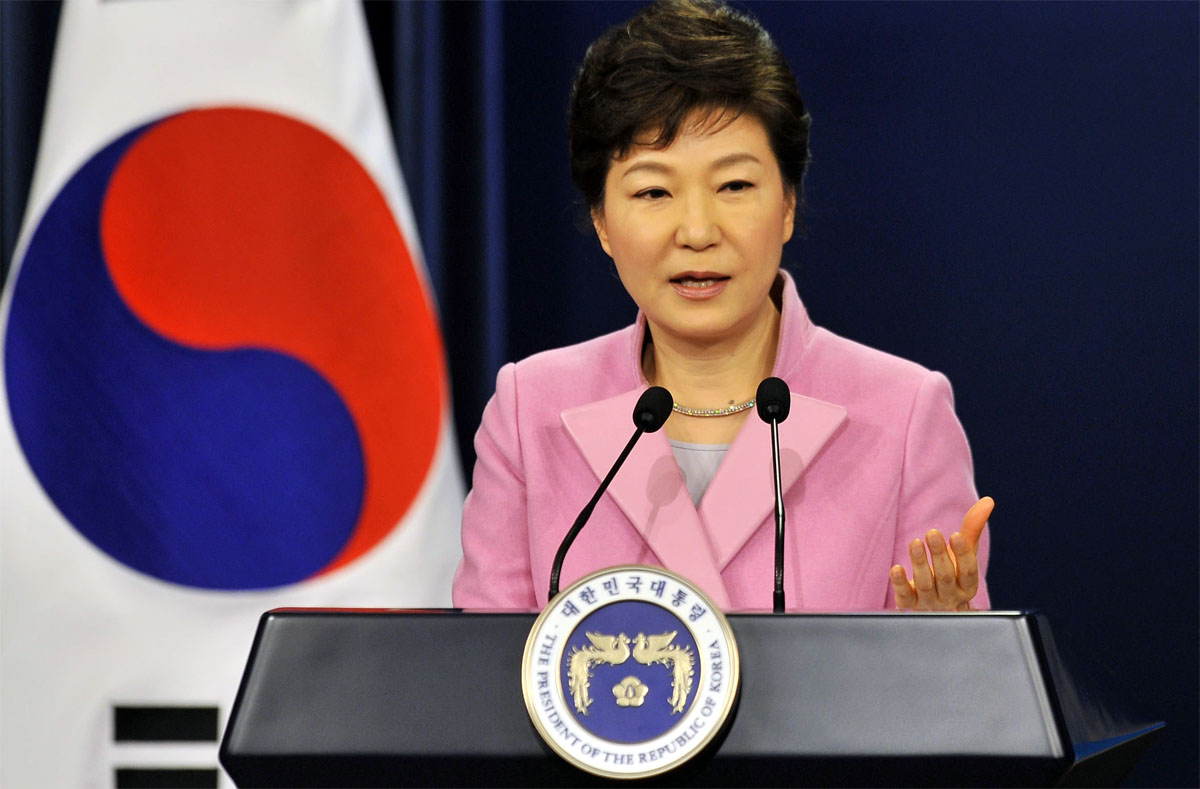
South Korea Former President Park Geun-hye Jailed for Life Over Martial Law Attempt
Former South Korean President Park Geun-hye has been sentenced to life imprisonment for her role in attempting to impose martial law during a political crisis, marking one of the most significant rulings in the country’s modern democratic history.
The Seoul Central District Court found Park guilty of abusing presidential powers, attempting to suppress dissent, and manipulating state security forces for political purposes. Prosecutors argued that her actions threatened the constitutional order and undermined democratic governance.
Park, South Korea’s first female president, was impeached in 2017 following mass protests triggered by corruption scandals and abuse-of-office allegations. The former leader has faced multiple prosecutions over the years, including charges of bribery, influence-peddling, and illegal control of state institutions.
The court emphasized that her attempt to enforce martial law was a severe violation of South Korea’s democratic principles. Legal experts have described the ruling as a clear message that executive overreach will not be tolerated, even at the highest levels of government.
READ ALSO:
- Hisbah Arrests Nine Muslims for Allegedly Breaking Ramadan Fast in Kano
- Ondo Monarch Killed as Bandits Strike Akure North
- LP Crisis Deepens as Abure Faction Rejects Otti’s Reconciliation Call
The sentence comes amid growing international attention on South Korea’s judicial independence. Analysts say the life term reinforces accountability in the country’s political system while serving as a deterrent to future leaders who might consider circumventing democratic institutions. Park may appeal the verdict to the South Korean Supreme Court, prolonging legal proceedings.
Human rights groups have praised the transparent judicial process, noting that fairness and due process remain critical, especially in politically sensitive cases. Meanwhile, the decision has reignited public debate over the balance of power between the presidency and democratic institutions in South Korea.
Background: Park Geun-hye and Martial Law Controversy
Park Geun-hye, daughter of former military ruler Park Chung-hee, governed South Korea from 2013 until her impeachment in 2017. Allegations during her tenure included attempts to deploy martial law powers to suppress opposition and consolidate control over government agencies. These efforts, combined with corruption and bribery scandals, culminated in her removal from office and subsequent criminal trials.
The case has been widely cited as a landmark test of South Korea’s democratic accountability and judicial independence, illustrating the nation’s commitment to prosecuting high-level abuses of power.
South Korea Former President Park Geun-hye Jailed for Life Over Martial Law Attempt
International
Israeli Airstrikes Kill 12 in Gaza as Violence Persists Despite Ceasefire
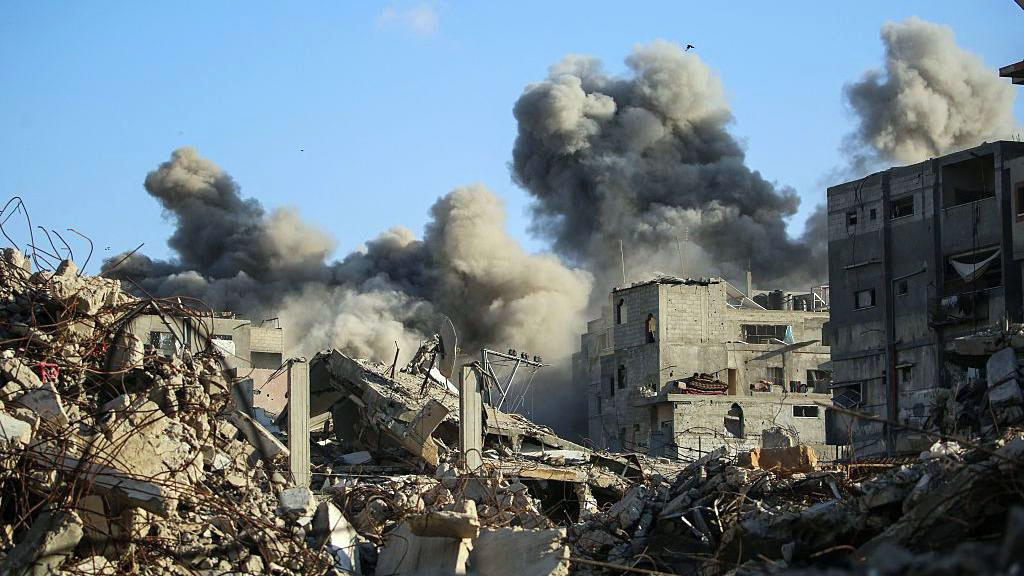
Israeli Airstrikes Kill 12 in Gaza as Violence Persists Despite Ceasefire
At least 12 Palestinians have been killed in Israeli airstrikes across the Gaza Strip, the territory’s civil defence agency reported on Sunday, marking one of the deadliest days since a fragile ceasefire was implemented. The strikes hit multiple areas, including Jabalia refugee camp in northern Gaza and the southern city of Khan Younis, leaving several others injured.
The Gaza Civil Defence, responsible for rescue and emergency operations under Hamas, said one airstrike struck a tent sheltering displaced civilians in Jabalia, killing at least five people and wounding others. Another strike in Khan Younis also claimed five lives, while additional shelling in Beit Lahia and western Gaza City caused further casualties. Local authorities said most victims were civilians, including families displaced by previous attacks.
READ ALSO:
- FBI Probe Continues as Ex‑Church Minister Who Confessed to Child Abuse Remains Free
- Presidency Dismisses El-Rufai’s Thallium Claim as Diversion From N432bn Probe
- Ghana Moves to Extradite Russian Man Over Secret Sex Video Scandal
The Israel Defence Forces (IDF) said its operations targeted armed militants and underground infrastructure allegedly used to launch attacks, describing the strikes as a response to ceasefire violations. Palestinian authorities condemned the strikes as a massacre and a breach of the truce, while international observers expressed concern over the continuing civilian casualties.
Since the U.S.-brokered ceasefire in October 2023, tensions in Gaza have remained high, with sporadic clashes and violations on both sides. Gaza health authorities report that over 600 Palestinians have been killed and more than 1,600 injured by Israeli strikes since the truce took effect. Humanitarian organisations warn that repeated airstrikes have devastated infrastructure, leaving displaced families vulnerable and worsening living conditions.
International observers note that the ongoing violence threatens reconstruction efforts and regional stability. With limited access for media and aid agencies, verifying casualty figures remains difficult, though reports consistently highlight the severe impact on civilians and displaced families.
The Gaza civil defence called on residents to stay vigilant, avoid military targets, and seek safety as authorities continue to respond to emergency situations across the territory. The situation underscores the fragility of the ceasefire and the urgent need for renewed diplomatic efforts to prevent further civilian casualties.
Israeli Airstrikes Kill 12 in Gaza as Violence Persists Despite Ceasefire
-

 News2 days ago
News2 days agoSaudi Arabia Confirms Sighting of Ramadan Crescent, Fasting Begins Wednesday
-

 metro2 days ago
metro2 days agoLagos Woman Shares Ordeal After Alleged Rape, Sparks Nationwide Outcry
-

 News2 days ago
News2 days agoRamadan Begins in Nigeria as Sultan Confirms Crescent Sighting
-

 metro2 days ago
metro2 days agoSeven Killed in Horrific Crash at Ota Toll Gate
-

 metro2 days ago
metro2 days agoDeadlock at National Assembly as House Snubs Electoral Act Bill Meeting on E-Transmission Clause
-

 News1 day ago
News1 day agoKorope Drivers Shut Down Lekki–Epe Expressway Over Lagos Ban (Video)
-

 Health1 day ago
Health1 day agoRamadan Health Tips: Six Ways to Stay Hydrated While Fasting
-

 International5 hours ago
International5 hours agoCanada Opens New Express Entry Draw for Nigerian Workers, Others





